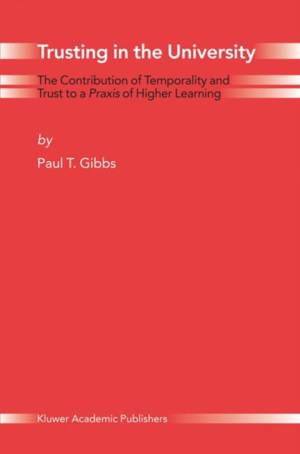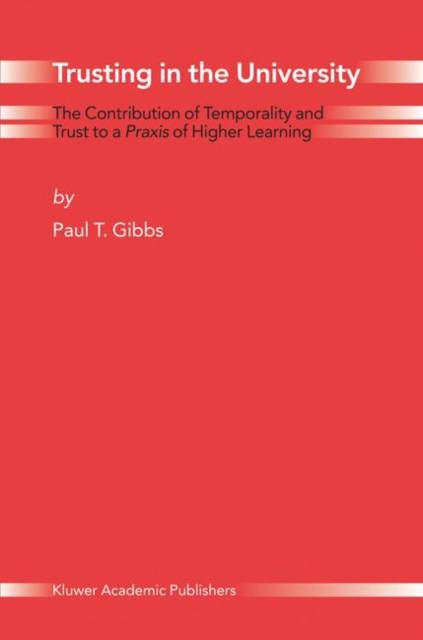
Door een staking bij bpost kan je online bestelling op dit moment iets langer onderweg zijn dan voorzien. Dringend iets nodig? Onze winkels ontvangen jou met open armen!
- Afhalen na 1 uur in een winkel met voorraad
- Gratis thuislevering in België vanaf € 30
- Ruim aanbod met 7 miljoen producten
Door een staking bij bpost kan je online bestelling op dit moment iets langer onderweg zijn dan voorzien. Dringend iets nodig? Onze winkels ontvangen jou met open armen!
- Afhalen na 1 uur in een winkel met voorraad
- Gratis thuislevering in België vanaf € 30
- Ruim aanbod met 7 miljoen producten
Zoeken
Trusting in the University
The Contribution of Temporality and Trust to a PRAXIS of Higher Learning
Paul T Gibbs
€ 153,95
+ 307 punten
Omschrijving
The world in which we learn is changing rapidly. That rapidity is driven by a range of influences, conveniently, but inadequately, clustered under the rubric of globalisation. . The context in which globalisation and education is often linked is that of progression, progression realisable through technology, the free movement of finances and the optimum utilisation of human capital. To fuel this progression, formal educational institutions have grown, adapted and changed to provide highly skilled 'outputs' to satisfy demand. Along the way, I will argue, the questioning, learning, reflecting and worthiness of formal education has been sacrificed for instrumentality, compliance and self-interest. This is seen throughout the educational system but this book concentrates on higher education and, more importantly, higher educational institutions that are known as universities. I will try to argue for a distinctive place for universities that does not resist progression but defines it differently from that allowable by the market. I propose a university system where students and faculty are together allowed to 'let learn' who they might become, rather than realise their being as the artefact of economic imperatives. I accept from the very beginning that this might be incompatible with universities being in the world of commerce and industry, in fact, I demand that they are not! However, my text is not a polemic against the capitalist entrapment of education per se but for the development of centres that question whilst engaging with the realities of our existence.
Specificaties
Betrokkenen
- Auteur(s):
- Uitgeverij:
Inhoud
- Aantal bladzijden:
- 216
- Taal:
- Engels
- Reeks:
Eigenschappen
- Productcode (EAN):
- 9781402023439
- Verschijningsdatum:
- 30/08/2004
- Uitvoering:
- Hardcover
- Formaat:
- Genaaid
- Afmetingen:
- 163 mm x 241 mm
- Gewicht:
- 476 g

Alleen bij Standaard Boekhandel
+ 307 punten op je klantenkaart van Standaard Boekhandel
Beoordelingen
We publiceren alleen reviews die voldoen aan de voorwaarden voor reviews. Bekijk onze voorwaarden voor reviews.











